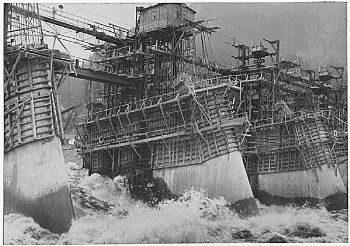January, 2009
Down the Road
by Larry
About four years ago, in an essay (The Shaky Second Four-Year Record of Modern Two-Term Presidents) published shortly after George W. Bush's reelection, I noted the challenges facing a second-term U.S. President. Just as was true at the end of Bill Clinton's time in the White House, most of the problems that had faced Bush in early 2004 have now, like the can kicked down the road, come to rest in front of the next President's place in history. Indeed, the challenges to an Obama administration are at least as intimidating as, if not greater than, those faced by his predecessor.
So let us examine some of the issues confronting this President, ways he is likely to be tested in his just commenced term in office. How might we gauge, four years hence, how well Obama has fulfilled the hopes so many have put in him and his presidency? I believe it comes down to a few pivotal issues:

Tennessee Valley Authority housing in Wilder, TN, during the Great Depression: "The sole water supply of this section of Wilder." - public domain photo from the Franklin D. Roosevelt Presidential Library and Museum |
 The Economy - The first half, more or less, of the last administration's rescue package, endorsed by the Democratically led Congress, has already been used, as well as billions more that were spent even before that official "bailout" of financial institutions and of other large enterprises. These unprecedented offerings of funds, often to the very managements that had so recently proved most incompetent as leaders of U.S. industry, have been hugely expensive, may not (in the form they took) have been warranted, and have even been decried as versions of socialism, not for the working and saving men and women on Main Street, but for the very wealthy at their expense. The claim, though, is that these efforts to stop the hemorrhaging in our economy are for the good of everyone, lest we all see a disastrous failure from which we may not recover for decades.
The Economy - The first half, more or less, of the last administration's rescue package, endorsed by the Democratically led Congress, has already been used, as well as billions more that were spent even before that official "bailout" of financial institutions and of other large enterprises. These unprecedented offerings of funds, often to the very managements that had so recently proved most incompetent as leaders of U.S. industry, have been hugely expensive, may not (in the form they took) have been warranted, and have even been decried as versions of socialism, not for the working and saving men and women on Main Street, but for the very wealthy at their expense. The claim, though, is that these efforts to stop the hemorrhaging in our economy are for the good of everyone, lest we all see a disastrous failure from which we may not recover for decades.
-
Last year's near economic collapse involved the wiping out of over ten trillion dollars in personal and corporate wealth in but a few weeks' time. It began in the U.S., this vaunted capitalist superpower. The crisis reminds me of what occurred two decades earlier to that heretofore foremost socialized superpower, the U.S.S.R. Our federal budget, in surplus only about a decade ago, is now well over a trillion dollars in the red and projected to remain so annually for the foreseeable future. It represents the worst federal budget deficit to gross domestic product ratio since World War II.
-
Yet so far it appears credit on both Main Street and Wall Street is about as scarce as before all the generous money printing commenced. It turns out, little was done to assure the previously profligate finance industry would spend their free dollars wisely, so taxpayers may still suffer for many years but have little to show for it.
-
In fact, it is an open question whether we are just in the most severe recession since the 1930s or instead have already entered a mild depression, similar to the one that recently affected Japan for over ten years except that this de-leveraging has also become global.
-
Worst case scenario: the world economy remains depressed for quite some time, accompanied by double-digit unemployment, high federal debt, severely weakened stock markets, evaporation of 401k, pension, and private nest egg assets, further plummeting of house prices, limited credit and consumer spending, rising taxes as a percentage of income, and substantial inflation or deflation.
-
On the other hand, if Obama can pull some rabbits out of his hat, one indication his presidency is succeeding would be if, at least by the end of his current term, there is economic growth again, stock and home prices appear to have stabilized if not actually begun to climb once more, folks are able to routinely get loans for decent credit again, employment is rising from whatever level it drops to in the next couple or three years, deflation has ceased but inflation is marginal, and there is faith not just in the U.S. but among our creditors overseas that we shall soon be paying down our huge debts, saving, and keeping taxes within reasonable bounds.

Members of the Army Air Corps, during World War II: "Women working on a plane" - public domain photo from the Franklin D. Roosevelt Presidential Library and Museum |
 Defense - Two of Obama's major campaign promises were that if he were elected we would be getting out of Iraq and beefing up our forces in Afghanistan. Yet in either country things might still, even after "the surge" strategy, get worse before they get better. There are also major defense-related concerns with Pakistan, Iran, North Korea, Russia, and, of course, terrorism.
Defense - Two of Obama's major campaign promises were that if he were elected we would be getting out of Iraq and beefing up our forces in Afghanistan. Yet in either country things might still, even after "the surge" strategy, get worse before they get better. There are also major defense-related concerns with Pakistan, Iran, North Korea, Russia, and, of course, terrorism.
-
China too is at least a competitor and has been taking full advantage of our focus on conflict in Iraq to expand its influence around the world. China is a proud country that sees her rightful boundaries including Taiwan. If she chose a period of apparent weakness for the U.S. as an opportune time to reabsorb that western-backed democracy, there may be little, short of a nuclear war, we could do to stop it. She has also shown an interest in developing cyber war capabilities.
-
Meanwhile, our close geographical and trading partner, Mexico, is experiencing severe enough unrest that Newt Gingrich has called it "a civil war." Closely linked as Mexico is with our immigration, employment, cultural, and security interests, trouble there can have repercussions for the U.S.
-
The Middle East persists as a hot spot so long as genuine agreement and stability is not achieved between Israel, her neighbors, and the Palestinians. Yet Israel has supported a vast expansion of settlements into formerly Palestinian lands, aggravating existing hatreds both in the region and through the Islamic world, and seems to lack the political will to alter this policy. The existing relationship between Jews and Palestinians has been compared to that of the supremacists in white-ruled, apartheid South Africa with its Black native populations. Meanwhile, partly in response to the perpetually unsettled situation in the Middle East and partly due to religious and ideological differences, terrorist groups remain intent on severe attacks against both Israel and its primary ally, the United States. Intelligence estimates suggest it is more likely than not that our country will suffer destruction via chemical, nuclear, or biological weapons within the next five years.
-
Worst case scenario: still involved in a big way in Iraq and Afghanistan, our forces stretched too thin, it is felt necessary to fight yet another military conflict; we are also effectively attacked with weapons of mass destruction; and/or cyber warfare methods are employed against us that shut down one or more of our key financial institutions, creating a cascade effect similar to what was experienced after the Lehman Brothers failure last year.
-
However, if Barack Obama's administration is successful, it will almost certainly require that we have most combat troops leaving Iraq by 2011 and increased military presence in (and stabilization of) Afghanistan, with no other major conflicts, and no 9/11 level or greater terrorist attacks against us.

Medical Corps Training, during World War II: "Casualty evaluation" - public domain photo from the Franklin D. Roosevelt Presidential Library and Museum |
 Healthcare - For decades, people have recognized that there is something seriously wrong with medicine in America. At this writing, health care represents over 15% (more than $2 trillion) of our annual gross domestic product. In percentage and absolute terms, this is the highest national cost for healthcare among the developed countries. While it keeps costing more, benefits for many are regularly being reduced.
Healthcare - For decades, people have recognized that there is something seriously wrong with medicine in America. At this writing, health care represents over 15% (more than $2 trillion) of our annual gross domestic product. In percentage and absolute terms, this is the highest national cost for healthcare among the developed countries. While it keeps costing more, benefits for many are regularly being reduced.
-
Popular myths here to the contrary, the U.S. ranks near the bottom in the provision and quality of healthcare for its citizens vs. those of other developed countries.
-
A growing number of us, now in the scores of millions, make do without any healthcare coverage, but then put great added burdens on hospitals and emergency clinics.
-
Medical offices must hire extra staff just to keep up with the thousands of different healthcare plans available to their patients. They are required so doctors, clinics, and hospitals can charge correctly from among the multiple variations of co-pay, amounts of employer payments, the diverse insurance company portions, the parts of the whole bill covered by Medicare Part A, B, or D, in some cases Medicaid's allocation, other fees, etc. Many of the multitude of such provisions change annually.
-
Companies have been driven out of business or are near bankruptcy due to medical care promised to career employees decades ago that has mushroomed to one of the biggest parts of business overhead. To offset the rising tide of healthcare costs, corporations that still pay such benefits are forced to raise prices on their goods and services, but this leads to their being less competitive in a global marketplace. Our healthcare is like a huge extra tax disadvantage for individuals and companies in this country, given that citizens or businesses in other developed world countries frequently pay significantly less for even better medical treatment.
-
Besides those who are uninsured, millions more get locked into companies, jobs, or locations they do not like or which offer them limited advancement simply because only in their current situations would they or their families have needed healthcare benefits.
-
Companies now may keep workers in temporary, part-time, or contract status rather than as regular, full-time, or salaried workers because they cannot afford the healthcare costs that might accompany giving workers more desirable ranks or positions.
-
Our country was founded on the notion we were due, as inalienable rights, life, liberty, and the pursuit of happiness. Although many other countries believe good medicine for its citizens is also a right, here we have a healthcare system that actually puts people's lives at risk or which circumscribes their liberty and happiness by forcing them to remain in less advantageous positions or communities solely to avoid the loss of medical care.
-
Worst case scenario: if the situation, often tabled before, is not rectified, healthcare will become an even greater drag on our country's growth and its citizens' quality of life.
-
Barack Obama has promised, though, to deal constructively, yet realistically with the healthcare problem in the U.S., and his achievement of this goal or failure in meeting it will be a major indication of his success as our 44th President.

Public Works Administration Project, Bonneville Power Dam, OR, during the Great Depression: "Rushing work on spillway piers to keep ahead of expected crest of flood" - public domain photo from the Franklin D. Roosevelt Presidential Library and Museum |
 Energy/Global Warming - The two issues are interdependent. U.S. leaders have realized it had an energy policy problem since at least the early 1970s, when OPEC, the Oil Producing and Exporting Countries, stopped selling petroleum to states that had been supporting Israel in the 1973 Yom Kippur War. Gasoline rationing, huge lines at the pumps, hikes in fuel costs, and lower max highway speeds resulted, but little was done of lasting impact on our energy production and consumption.
Energy/Global Warming - The two issues are interdependent. U.S. leaders have realized it had an energy policy problem since at least the early 1970s, when OPEC, the Oil Producing and Exporting Countries, stopped selling petroleum to states that had been supporting Israel in the 1973 Yom Kippur War. Gasoline rationing, huge lines at the pumps, hikes in fuel costs, and lower max highway speeds resulted, but little was done of lasting impact on our energy production and consumption.
-
Compounding this in recent decades, we have a growing international balance of payments crisis, are pouring trillions of dollars for energy costs into foreign countries that often are our adversaries or that support terrorism, are subject at times to wide fluctuations in fuel costs, with gasoline prices at times over $4 a gallon, and are finding that a too great reliance on carbon-based energy resources is affecting both the environment generally and global warming specifically.
-
If, as most scientists now believe, global warming is caused in part by human additions to greenhouse gases, which in turn are released largely by carbon-based energy production and use, and it is as dangerous to the climate as so far predicted, it is vital that as a species we get a better handle on energy development and on conservation. Projections into the next few generations by climate scientists make for thrilling reading, all the more so if nothing substantial is done in the near future to reign in dependence on carbon-based fuels.
-
Worst case scenario: the energy and global warming challenges are still not met, and we enter a period of extreme energy shortages and costs combined with runaway global warming. Ultimately, this would usher in a period of vast species extinctions and put civilization in jeapardy.
-
The incoming Obama administration has vowed to also deal with these issues, and it should be easy to see whether or not he lives up to those promises.

Seeking Social Security benefits, during the Great Depression: "Homeless man" - public domain photo from the Franklin D. Roosevelt Presidential Library and Museum |
 Entitlements - Arguably the largest Ponzi scheme on record is our multi-branched program of federal monetary and medical benefits for the old, indigent, or disabled, especially those under Medicare, Medicaid, Social Security Administration (SSA) income, and Veterans Affairs (VA) provisions. All would seem to depend on a growing population of younger workers and taxpayers offsetting the ever higher costs. Say what you will pro or con socialism, but it would appear only realistic and good business, particularly after the bursting of several recent bubbles has reminded us credit is never unlimited, that no great power, Soviet or American, may long remain in hegemony which spends far more than it takes in. Yet, the baby boomer phenomenon, a later reduction in birth rates, and longer life expectancies (than when SSA and VA laws were enacted) assure as things stand that our nation will before long be paying out significantly more in benefits than it is receiving.
Entitlements - Arguably the largest Ponzi scheme on record is our multi-branched program of federal monetary and medical benefits for the old, indigent, or disabled, especially those under Medicare, Medicaid, Social Security Administration (SSA) income, and Veterans Affairs (VA) provisions. All would seem to depend on a growing population of younger workers and taxpayers offsetting the ever higher costs. Say what you will pro or con socialism, but it would appear only realistic and good business, particularly after the bursting of several recent bubbles has reminded us credit is never unlimited, that no great power, Soviet or American, may long remain in hegemony which spends far more than it takes in. Yet, the baby boomer phenomenon, a later reduction in birth rates, and longer life expectancies (than when SSA and VA laws were enacted) assure as things stand that our nation will before long be paying out significantly more in benefits than it is receiving.
-
The last time America faced up to such an entitlements conundrum was in the mid-1980s, when Social Security was actually fixed by modestly increasing the burden on workers and reducing by a small amount the potential benefits of those same taxpayers, like me, once they would be eligible for them. The new plan worked well but was clearly not a final cure. The patient simply went into remission.
-
Worst case scenario: if the entitlements arithmetic is not corrected, we either bankrupt the national treasury or steal an ever larger share of already strapped younger workers' paychecks, both unsupportable "remedies." As in the hilarious book (now understandably popular among the younger crowd), Boomsday, by Christopher Buckley, there is at least one other option, euthanasia for people about my age or older.
-
Dire as the costs of doing nothing about entitlements are, they are all as yet subject to viable cures that, though not without some pain, would be far better than paying out money with nothing to back it, greatly increasing the burden on younger generations, or going with Buckley's Boomsday suggestion. I am particularly interested to see that Obama tackles entitlements head-on. Much as I want to see a remedy for the plight of our citizens of less advanced age, euthanasia is also not looking to me like a very cool choice at the moment.
There are any number of other issues of concern that could and should be addressed in the next few years: education; immigration; aging infrastructure; etc. The above are just my own picks of the ones requiring the most serious and urgent attention.

Public Works Administration, NJ, during the Great Depression: "A rivet heater keeps the job fires burning during construction of the medical center" - public domain photo from the Franklin D. Roosevelt Presidential Library and Museum |
My point would not be that precisely those are the only five things to be dealt with in an Obama presidency, but that there are, regardless of exactly which ones are chosen, several key issues likely to shed light on whether the new administration is a success or a failure and that, with such paramount concerns in mind, it will be fairly easy to see in the months and years ahead how he is doing.
There is a surprising amount of goodwill in the electorate about the proposals of our new President. A poll just released indicates 71% of us are favorable about his making needed changes on big policy items. I share that optimism. Although the tests ahead would seem to be daunting, there is also a willingness I have not seen in a long time that we put partisan differences aside to get our country back on track in a variety of fundamental ways. There is also a groundswell of enthusiasm for him in much of the rest of the world.
My sanguine view is tempered, however, by recalling how similar the current mood is to that forty-eight years ago on the eve of the inauguration - it actually seemed more like a coronation - of John F. Kennedy. Through little or no fault of his own, this first member of the Roman Catholic faith to be elected U.S. President, who, like Obama, was a younger, energetic, and eloquent man capable of capturing the imagination, even love, of a nation, never lived up to the intense expectations for him. And within seven years, we were embroiled in the Vietnam War, had seen three great leaders assassinated, were in the midst of great domestic strife, were watching the burning of many of our inner cities, and were in many cases questioning our government as not before in several generations.
However ominous the priority concerns above may sound, the overall geopolitical stakes would not appear to be as great for America in the next four years as then. After all, during the 1960s we were in a Cold War. The worst case would have been atomic annihilation followed by "nuclear winter." Nonetheless, a President Barack H. Obama will obviously have a great deal on his plate. May he and our nation now have great success, if for no other reason than that very large issues are overdue for resolution and action. We cannot afford to see them yet again kicked down the road.





